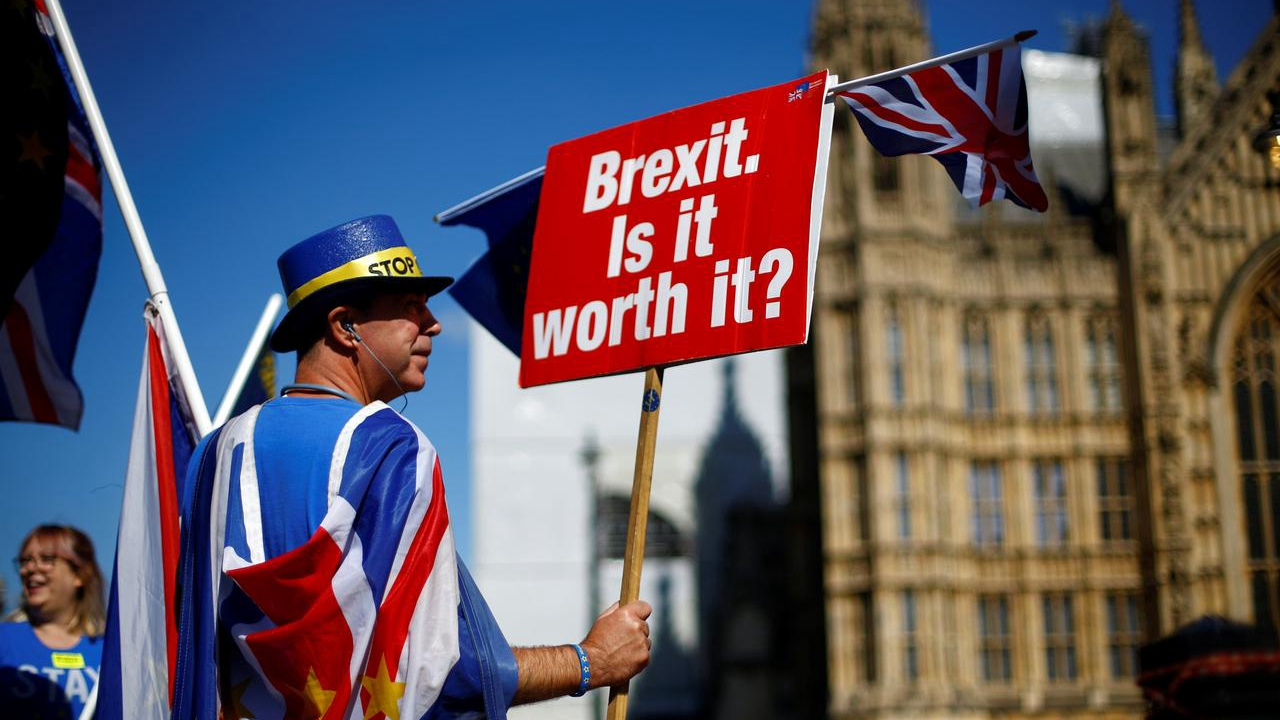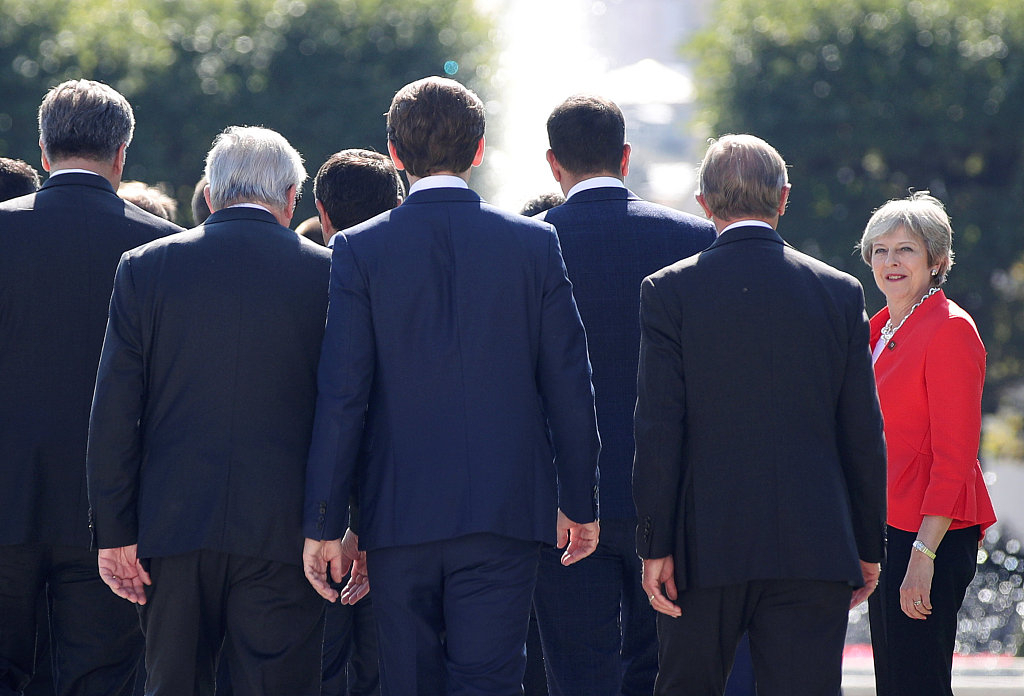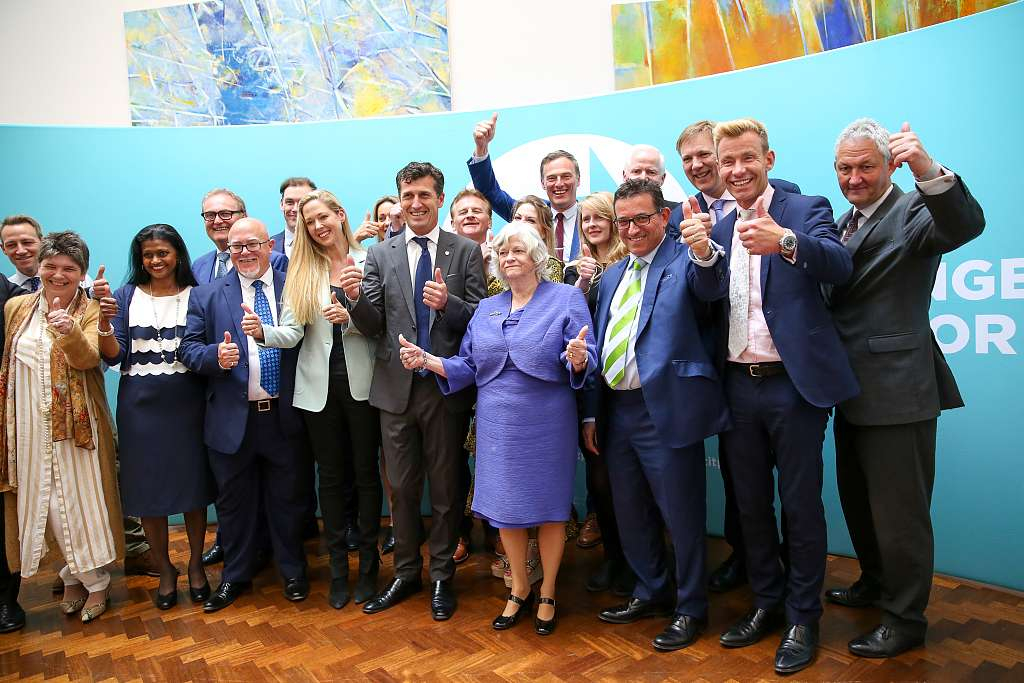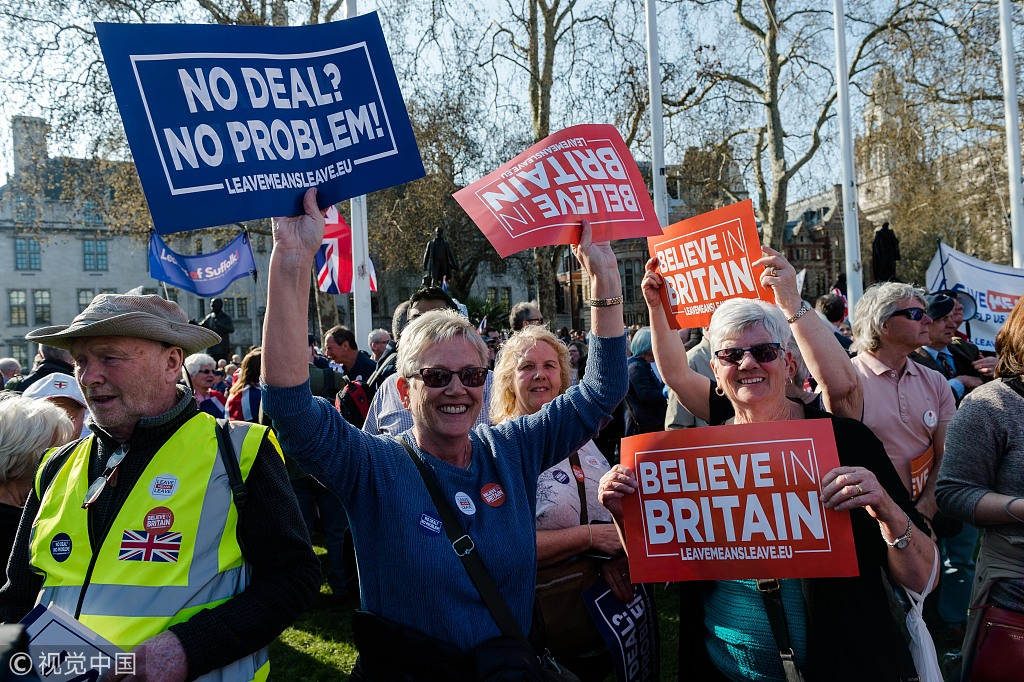
Opinion
07:43, 30-May-2019
Is the next UK Prime Minister able to commit to a no-deal Brexit?
Chris Deacon

Editor's note: Chris Deacon is a postgraduate researcher in politics and international relations at the University of London and previously worked as an international commercial lawyer. The article reflects the author's opinion, and not necessarily the views of CGTN.
As the contest to become the next leader of the UK's governing Conservative Party – and, therefore, Prime Minister – hots up, many of the favorite candidates, such as Boris Johnson and Dominic Raab, have committed to leaving the European Union (EU) with or without a deal on October 31.
While they tend to agree that, ideally, the UK would leave with a deal, they have objections to elements of the deal that Theresa May has negotiated.

A red-jacketed May arrives for a family photo with a phalanx of male leaders in dark suits during the European Union leaders informal summit in Salzburg, Austria, September 20, 2018. /VCG Photo
A red-jacketed May arrives for a family photo with a phalanx of male leaders in dark suits during the European Union leaders informal summit in Salzburg, Austria, September 20, 2018. /VCG Photo
The problem, however, is that the EU has made clear that this is the only deal available and, therefore, the likely future Prime Minister is committing to a no-deal Brexit on October 31.
In reality, however, such a commitment poses multiple difficulties. These difficulties relate to both the Conservative Party's own political interests as well as the UK's parliamentary system more generally.
Firstly, the Conservative Party is in a difficult position as to how to proceed with its Brexit policy. The party recently lost a huge proportion of its votes to the Brexit Party in the European elections because the latter endorsed leaving the EU without a deal, which is becoming increasingly popular among Brexit-supporting members of the public.
The logical solution to this would be that the Conservatives also tack to this position to undermine the Brexit Party's surge in support and, indeed, that does appear to be what these candidates are attempting to do.
The problem, however, is that this is a somewhat short-sighted move. If the next Prime Minister really does endorse no-deal and pursues this as the government's policy, it is highly likely that a minority of Conservative MPs who are bitterly opposed to such an eventuality will put their country before their party and rebel.

Newly elected Brexit Party Members of the European Parliament (MEPs) are seen during the EU election results press conference in Westminster, May 27, 2019. /VCG Photo
Newly elected Brexit Party Members of the European Parliament (MEPs) are seen during the EU election results press conference in Westminster, May 27, 2019. /VCG Photo
The government already does not enjoy a majority in the House of Commons – they rely on the support of the Northern Irish Democratic Unionist Party. Even if this support continues (which is no certainty by any means), just a few rebel MPs from the Conservative backbenches could topple the government.
What would be the result of this? Likely, a general election in which the Conservative Party would be utterly trounced by the Brexit Party, possibly losing hundreds of their seats, but almost certainly losing their position as the governing party. This would hardly be a glorious beginning to the premiership of the next leader.
Even if the government is somehow able to escape the triggering of a general election, it appears highly unlikely that they will be able to get a no-deal Brexit past Parliament. British MPs have consistently voted in large majorities against such an eventuality, and this does not appear likely to change in the near future.
British parliamentary procedure is arcane, to say the least, and there is some debate over the extent to which MPs could legally stop a no-deal Brexit. It is currently the position in law that the UK will leave the EU on October 31, and so this legislation would need to be amended to a later date (or such that no Brexit happens at all).

Newly elected Brexit Party Members of the European Parliament (MEPs) are seen during the EU election results press conference in Westminster, May 27, 2019. /VCG Photo
Newly elected Brexit Party Members of the European Parliament (MEPs) are seen during the EU election results press conference in Westminster, May 27, 2019. /VCG Photo
Even more importantly, to avoid no-deal, a further extension of the Article 50 period would need to be negotiated with the European Council, and these negotiations would need to be conducted by the government. It is not especially easy for MPs to force the government to engage in such negotiations and direct their aim, although this has already occurred once earlier this year.
This week, however, the Speaker of the House of Commons, John Bercow – who enjoys immense power to decide on parliamentary conduct and the actions of the government – has stated that it would be "unimaginable" for MPs not to be given a say on leaving the EU without a deal. He appears likely to side with MPs opposing such a move, and against the government, in any showdown on this issue.
Thus, even if the next Conservative leader and Prime Minister can avoid a general election, they may well be prevented from pursuing a no-deal Brexit by MPs who refuse to countenance the prospect.
Of course, we must not forget the other party in this process – the EU itself. The heads of government of the 27 member states must also agree to an extension. But even if they do not, MPs may have a trump card in being able to revoke the UK's Article 50 notification, which the European Court of Justice confirmed last year was legally possible.
In this way, there are countless, very high hurdles ahead for any future Conservative leader who wishes to pursue a no-deal Brexit. To commit to it at this stage, while assisting with their chances of winning the party contest, may be a major mistake in the long term if causes traditional Conservative voters to feel betrayed when Brexit does not materialize as they wish once again.
(If you want to contribute and have specific expertise, please contact us at opinions@cgtn.com.)

SITEMAP
Copyright © 2018 CGTN. Beijing ICP prepared NO.16065310-3
Copyright © 2018 CGTN. Beijing ICP prepared NO.16065310-3